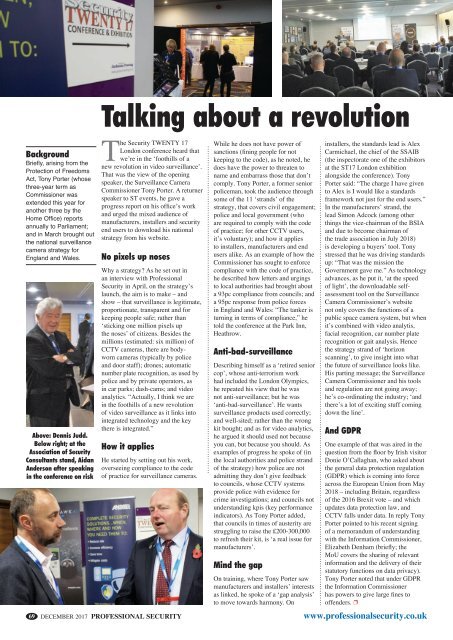Draft27-12
Create successful ePaper yourself
Turn your PDF publications into a flip-book with our unique Google optimized e-Paper software.
Talking about a revolution<br />
Background<br />
Briefly, arising from the<br />
Protection of Freedoms<br />
Act, Tony Porter (whose<br />
three-year term as<br />
Commissioner was<br />
extended this year for<br />
another three by the<br />
Home Office) reports<br />
annually to Parliament;<br />
and in March brought out<br />
the national surveillance<br />
camera strategy for<br />
England and Wales.<br />
Above: Dennis Judd.<br />
Below right; at the<br />
Association of Security<br />
Consultants stand, Aidan<br />
Anderson after speaking<br />
in the conference on risk<br />
69<br />
The Security TWENTY 17<br />
London conference heard that<br />
we’re in the ‘foothills of a<br />
new revolution in video surveillance’.<br />
That was the view of the opening<br />
speaker, the Surveillance Camera<br />
Commissioner Tony Porter. A returner<br />
speaker to ST events, he gave a<br />
progress report on his office’s work<br />
and urged the mixed audience of<br />
manufacturers, installers and security<br />
end users to download his national<br />
strategy from his website.<br />
No pixels up noses<br />
Why a strategy? As he set out in<br />
an interview with Professional<br />
Security in April, on the strategy’s<br />
launch, the aim is to make – and<br />
show – that surveillance is legitimate,<br />
proportionate, transparent and for<br />
keeping people safe; rather than<br />
‘sticking one million pixels up<br />
the noses’ of citizens. Besides the<br />
millions (estimated: six million) of<br />
CCTV cameras, there are bodyworn<br />
cameras (typically by police<br />
and door staff); drones; automatic<br />
number plate recognition, as used by<br />
police and by private operators, as<br />
in car parks; dash-cams; and video<br />
analytics. “Actually, I think we are<br />
in the foothills of a new revolution<br />
of video surveillance as it links into<br />
integrated technology and the key<br />
there is integrated.”<br />
How it applies<br />
He started by setting out his work,<br />
overseeing compliance to the code<br />
of practice for surveillance cameras.<br />
DECEMBER 2017 PROFESSIONAL SECURITY<br />
While he does not have power of<br />
sanctions (fining people for not<br />
keeping to the code), as he noted, he<br />
does have the power to threaten to<br />
name and embarrass those that don’t<br />
comply. Tony Porter, a former senior<br />
policeman, took the audience through<br />
some of the 11 ‘strands’ of the<br />
strategy, that covers civil engagement;<br />
police and local government (who<br />
are required to comply with the code<br />
of practice; for other CCTV users,<br />
it’s voluntary); and how it applies<br />
to installers, manufacturers and end<br />
users alike. As an example of how the<br />
Commissioner has sought to enforce<br />
compliance with the code of practice,<br />
he described how letters and urgings<br />
to local authorities had brought about<br />
a 93pc compliance from councils; and<br />
a 95pc response from police forces<br />
in England and Wales: “The tanker is<br />
turning in terms of compliance,” he<br />
told the conference at the Park Inn,<br />
Heathrow.<br />
Anti-bad-surveillance<br />
Describing himself as a ‘retired senior<br />
cop’, whose anti-terrorism work<br />
had included the London Olympics,<br />
he repeated his view that he was<br />
not anti-surveillance; but he was<br />
‘anti-bad-surveillance’. He wants<br />
surveillance products used correctly;<br />
and well-sited; rather than the wrong<br />
kit bought; and as for video analytics,<br />
he argued it should used not because<br />
you can, but because you should. As<br />
examples of progress he spoke of (in<br />
the local authorities and police strand<br />
of the strategy) how police are not<br />
admitting they don’t give feedback<br />
to councils, whose CCTV systems<br />
provide police with evidence for<br />
crime investigations; and councils not<br />
understanding kpis (key performance<br />
indicators). As Tony Porter added,<br />
that councils in times of austerity are<br />
struggling to raise the £200-300,000<br />
to refresh their kit, is ‘a real issue for<br />
manufacturers’.<br />
Mind the gap<br />
On training, where Tony Porter saw<br />
manufacturers and installers’ interests<br />
as linked, he spoke of a ‘gap analysis’<br />
to move towards harmony. On<br />
installers, the standards lead is Alex<br />
Carmichael, the chief of the SSAIB<br />
(the inspectorate one of the exhibitors<br />
at the ST17 London exhibition<br />
alongside the conference). Tony<br />
Porter said: “The charge I have given<br />
to Alex is I would like a standards<br />
framework not just for the end users.”<br />
In the manufacturers’ strand, the<br />
lead Simon Adcock (among other<br />
things the vice-chairman of the BSIA<br />
and due to become chairman of<br />
the trade association in July 2018)<br />
is developing a buyers’ tool. Tony<br />
stressed that he was driving standards<br />
up: “That was the mission the<br />
Government gave me.” As technology<br />
advances, as he put it, ‘at the speed<br />
of light’, the downloadable selfassessment<br />
tool on the Surveillance<br />
Camera Commissioner’s website<br />
not only covers the functions of a<br />
public space camera system, but when<br />
it’s combined with video analytis,<br />
facial recognition, car number plate<br />
recognition or gait analysis. Hence<br />
the strategy strand of ‘horizon<br />
scanning’, to give insight into what<br />
the future of surveillance looks like.<br />
His parting message; the Surveillance<br />
Camera Commissioner and his tools<br />
and regulation are not going away;<br />
he’s co-ordinating the industry; ‘and<br />
there’s a lot of exciting stuff coming<br />
down the line’.<br />
And GDPR<br />
One example of that was aired in the<br />
question from the floor by Irish visitor<br />
Donie O’Callaghan, who asked about<br />
the general data protection regulation<br />
(GDPR) which is coming into force<br />
across the European Union from May<br />
2018 – including Britain, regardless<br />
of the 2016 Brexit vote – and which<br />
updates data protection law, and<br />
CCTV falls under data. In reply Tony<br />
Porter pointed to his recent signing<br />
of a memorandum of understanding<br />
with the Information Commissioner,<br />
Elizabeth Denham (briefly; the<br />
MoU covers the sharing of relevant<br />
information and the delivery of their<br />
statutory functions on data privacy).<br />
Tony Porter noted that under GDPR<br />
the Information Commissioner<br />
has powers to give large fines to<br />
offenders. p<br />
www.professionalsecurity.co.uk<br />
p68,9 STa 27-<strong>12</strong>.indd 1 18/11/2017 15:16










